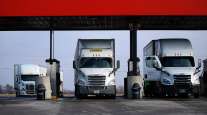Senior Reporter
Diesel, Natural-Gas Engine Makers Compete for Slice of VW Settlement

This story appears in the Nov. 14 print edition of Transport Topics.
Advocates of heavy-duty engines powered by diesel or natural gas are vying for a share of the windfall directed at nitrogen oxide mitigation in all 50 states after recent approval of the federal government’s multibillion-dollar settlement with Volkswagen AG.
At issue was years of excessive emissions from some VW vehicles.
U.S. District Judge Charles Breyer in San Francisco on Oct. 25 approved the terms of a $14.7 billion settlement that came after it was shown VW at times intentionally used software to defeat emissions controls in about 500,000 vehicles from 2009 to 2015, which increased NOx emissions beyond the regulated limits.
As part of the settlement, $2.7 billion will fund NOx mitigation strategies in all 50 states, based on the number of polluting VWs operated there. A court-appointed trustee will manage the fund, and states will decide how to spend their share.
“Competition for settlement dollars in each state has already started in earnest,” said Glen Kedzie, energy and environmental counsel for American Trucking Associations. “The VW settlement affords a tremendous opportunity for states to provide financial assistance to replace older diesel trucks with newer, lower-NOx emitting diesel or natural gas vehicles.”
Six states will receive about 40% of the funds. California is set to receive $381 million, Texas $191 million, Florida $152 million, New York $117 million, Pennsylvania $110 million and Washington $103 million, according to the settlement.
Vying for the funds could get messy, one diesel advocate suggested, noting that marine and rail projects also will be eligible.
“I don’t want to call it a food fight, but there is going to be a lot of posturing amongst different technologies and their folks about which is the best thing,” said Allen Schaeffer, executive director of the Diesel Technology Forum, which termed the settlement one of the largest of its kind.
VW will put the money in over three years, and the first check for $900 million will come in November, and then annually until the full amount is paid, Natural Gas Vehicles for America President Matthew Godlewski said.
The first projects should be taking shape in about a year, he said.
“Any way you cut this, this is going to be a substantial opportunity for the natural gas-vehicle industry to be part of this and sell more engines, build more stations, more dispensers, more compressors,” Godlewski said. “This is going to be a good boost to the industry over the next 10 years as these monies are spent.”
Rob Neitzke, president of Cummins Westport Inc., a manufacturer of natural-gas engines, said the timing for the distribution of $2.7 billion “aligns very well with CWI’s release of our near zero emissions products, the ISL G NZ this year and ISX12 G planned for January 2018, that reduce NOx emissions by 90% below the current emissions standards.”
For on-road categories, diesel and natural gas actually get the same funding treatment, Schaeffer said. “So no difference there, but electric vehicles get higher allocations” of the funds — as do government-run fleets, compared with private fleets.
Schaeffer added: “In our outreach to states, we are hearing that there are a few states that are not looking favorably on diesel as a technology of choice.”
But diesel technology is readily available, he said, and states could start seeing measurable improvements in air quality in a year. “And if you are concerned about the timing of NOx mitigation, which we think you should be, then the diesel option is really the best option. What I am talking about primarily is replacing older [diesel-fueled] trucks with newer [diesel-fueled] trucks.”
Meanwhile, on Dec. 1, startup truck manufacturer Nikola is expected to unveil Nikola One. The hydrogen fuel cell-powered electric Class 8 truck will get 15-20 mpg with zero emissions under full load, according to the company. Nikola added that it has $3 billion in “reservations ” for the truck.
However, “Nikola has not had any conversations with any government agencies regarding the VW settlement,” Colleen Robar, a spokeswoman for the Salt Lake City-based company, told Transport Topics on Nov. 3.
The Electric Drive Transportation Association advocates “more significantly” on the federal side to increase use of electric vehicles, President Genevieve Cullen said. “We don’t have a specific advocacy plan directed toward that [VW] settlement.




